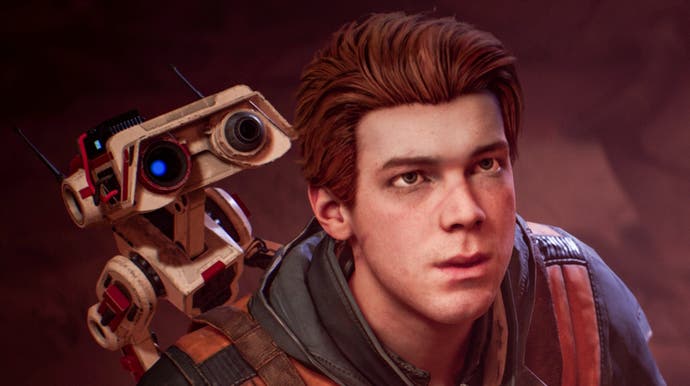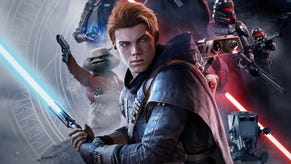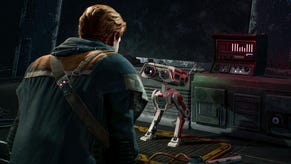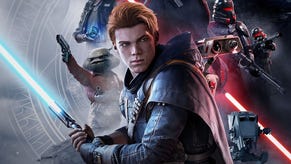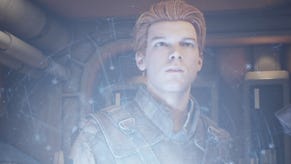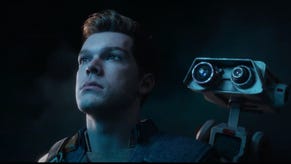Star Wars Jedi: Fallen Order director on risk-taking, crunch, and Cal
"It's something that's going to live forever."
Star Wars Jedi: Fallen Order hasn't had the easiest path to tread. In the shadow of the PR mess surrounding Star Wars Battlefront 2's microtransactions, and the disappointing cancellation of Visceral's title, the weight of the world's expectations for a compelling single-player Star Wars game have fallen heavily on Respawn's shoulders - as if producing a game for one of the world's biggest franchises wasn't already pressure enough.
Things didn't get off to the best start, too, with the first EA Play video underwhelming fans who felt the game looked too linear, and the combat too simple. But soon after, things began to change: journalists went hands-on with the title and reported on its Metroidvania influences and FromSoft-style gameplay, an extended gameplay video was released, and the most recent trailer seems to have gone down well with fans. And, having spent an additional three hours with the game, I'm feeling significantly more confident in its potential. Many of the E3 demo's problems seem to have been resolved, and it's starting to show sparks of that wonderful Star Wars charm.
Likely in an effort to keep the story top secret, there's still an air of mystery surrounding the game - and plenty of questions about the narrative remain. With less than a month left until the game's release, I spoke with director Stig Asmussen at a Star Wars Jedi: Fallen Order preview event in Los Angeles this week to talk about the final stages of development, the team's philosophy surrounding the writing, and what it means to be working on a canon Star Wars game.
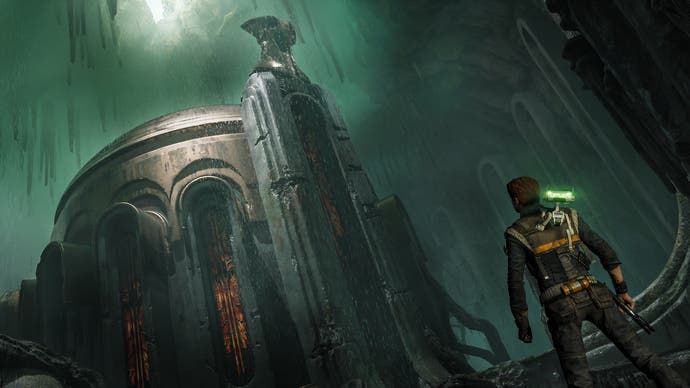
What are the main changes you've made since the E3 demo - anything big, or is it pretty much the same with some tweaks?
Stig Asmussen: That's a good question - since E3 we've done a lot of playtesting - we did playtesting before E3, but we've done a lot since. And probably the biggest change that we've made is difficulty in the game. Most of us at work like a challenge, but we recognise this is Star Wars, [which has] a huge audience, we don't want anybody to feel left out. So we made some adjustments, we added a new story difficulty mode, overall we kind of tweaked things down a little bit for our default mode. And then we made an even harder mode. And all that was influenced by what we were finding in the playtesting, and iteration.
Another big thing that's been pretty magical has been to really see all the cinematics and the story come together, and - this game, I've mentioned it before, it was critical the story rings true and comes through, and seeing that all come together and see the performances come through, and the final textures and lighting and sound and music.
How have you been managing crunch in the final stages of development, in terms of keeping the game on track without pushing people?
Asmussen: We did something different on this game compared to what I've been involved with in other projects. Projects I've worked on in the past, they had mandatory crunches - basically everybody said "you've gotta work these hours", and we realised that wasn't a fair and sustainable approach. And we left it up to the team - it's like "look everybody I think carries their own responsibilities and their own tasks, and takes them very seriously, so why treat people like children, and say you have to be here at a certain time?" So if you're going to be here doing these extra hours, it's your choice, we're going to support you and make sure you've got food, we're not going to tell you there are certain hours we're going to be crunching at. You can make your own schedule, and the leads made a commitment to put in extra effort and extra hours as well to show that we're all in it together.
What about indirect pressure - do you try to keep an eye out in case people are spending too much time working?
Asmussen: Absolutely - I know there are several times over the course of development where I told people to go home. You get so close to it you lose perspective, and not only that you risk people burning out. At Respawn it's a really big deal [that] we understand your life outside of work is far more important than what you're doing in the office, and we try to respect that.
What have been the main challenges in the development of this game, and how have you managed them?
Asmussen: First and foremost is working on the biggest franchise in the world, and not so much with our partnership - early on there was definitely a feeling we had to earn their respect at Lucasfilm, and we had to understand what they desired out of a Star Wars game and then how we'd put our touch on that. But really understanding the weight of that, what that means - there's going to be so many eyes on this game, and dealing with that pressure, and dealing with that when we're making decisions, and leaning on Lucasfilm to help out to make sure we can navigate those waters.
Also, it's a new team - none of us have really done this together, let alone on Star Wars, so when we hit roadblocks or dead ends and we're staring at that mountain at the end like "how do we get all this work done", we have to come together - we can't necessarily point back like "remember how we did this on the last game" - we can only point back to our milestones on this game. Now we actually have it, and we're done, and we've got that trust in each other, so that was a huge thing.
And it's a new game! It's not like we're building a sequel. We're building all-new characters, we're building new lore in Star Wars, we're building new mechanics - that's stuff we can build on as a team in the future.
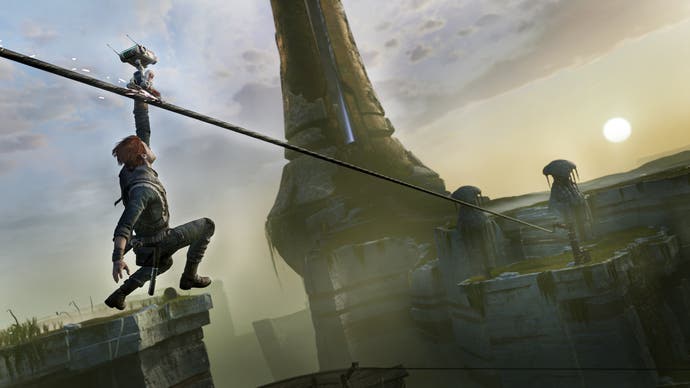
Touching on the Lucasfilm collaboration and topic of canon - what would you say the value of doing a canon Star Wars game is, compared to a non-canon game where you might have more creative freedom?
Asmussen: Personally I can say what I think the value of doing an authentic - you say canon - Star Wars game [is]... selfishly, we can put our touch on this really magical universe and it's something that's going to live forever. Maybe it'll be used in other ways and other places that we never imagined that it would for this game. I think there's some really heartfelt characters and places we've developed for this game I would personally love to see move on.
Yeah, we could have done something that wouldn't be considered part of lore, and it might have been a little bit easier, but we didn't want to do it the easy way. We wanted to do it the way that's real.
So, to you, what is Star Wars about - how would you explain it to someone?
Asmussen: What is it about? It's really hard for me to describe. There's a certain magic to it that feels different, but it feels right, because it's been such a part of my life for 40 years. And I think it's a magic that transcends different age groups, it's something that's friendly to children, because there's things within Star Wars that resonate. But also everyone can partake in that fun, and that action and that speed - and the thrill of going to this place.
With the recent films we've seen more risk-taking - such as The Last Jedi and Rogue One - which have deviated a little from the traditional Star Wars formula. So I was wondering with the writing if you've been sticking to the traditional style, or taking more risks?
Asmussen: With the writing I think there's a style that we wanted to capture, that feels more like something you would find in the original trilogy. But that's just stylistically what we chose, we wanted it to feel like these characters would belong if you were painting with that brush. Within that though I think we did take some risks... I don't want to get into any of those right now, hopefully when you're playing the game you'll be like "oh maybe that's what Stig was talking about", but I don't think we've played it safe. Maybe on the surface it appears that way, but there's a lot of depth and complexity to our characters and the world they find themselves in and the conflict, that allowed us to do some things I think are fresh.
Did the backlash to those films - when they did take risks, and some people didn't like things such as diversity and themes of failure and went "this isn't normal Star Wars" - was that something that weighed on your mind at all when developing Fallen Order?
Asmussen: We all read Reddit, and we're all affected by that in different ways. I know everybody who's working on Jedi: Fallen Order and I assume people working on other stuff take it very seriously, and I know every decision that we've made we've tried to do it from a fan's perspective, and tried to make sure that we're as true to the source as possible.
What are the main themes in Fallen Order, what sort of ideas are you exploring?
Asmussen: I think the main theme is what it means to be a Jedi in these dark times, and I think we find Cal and other characters over the course of the game questioning the differences between what's right and what's wrong, and riding that line, because everything's been turned upside down. It's all about him finding his own path, not just him but the whole crew finding their own way. I think there's a lot of themes in regards to family, and regaining what's been lost, or at least hoping to regain what's been lost.
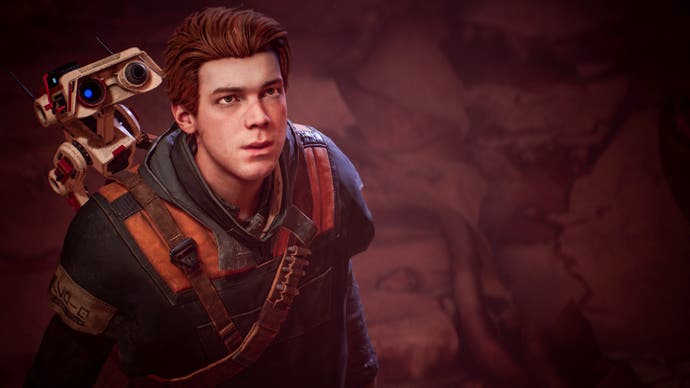
A lot of people have said they haven't really got a sense of Cal's character or personality from the visuals, is there more to Cal than first meets the eye?
Asmussen: I welcome that on the surface he might not seem like there's a lot that makes him tick, but that's what playing the game is about. I know especially, we were talking about it earlier, finalising the game and seeing the dramatic performances coming through, and just the fact that I think Cam [Cameron Monaghan] has done such a fantastic job, really realising who this character is and, to be honest, owning it to a certain extent. There's certainly more than meets the eye.
In a GI interview I think you said the reason you went for a male protagonist is because "the main films have Rey" - so I was wondering why there can only be one female Star Wars hero at a time when previously in most Star Wars games it's mainly been male protagonists?
Asmussen: I don't think there was a conscious like "you cannot make a female protagonist in the game", and we were completely open to doing either way. But the one thing I will say is we wanted to have a real character that was in the game, this is an authentic story. So it felt like to a certain extent... it wasn't just Force Awakens, it was Rogue One too... and I think through casting we arrived on Cam, because we felt like he basically filled the role we wanted for the game. But it wasn't something that was consciously... I think it was something that was taken out of context and worded wrong, it wasn't like "you have to work on a male protagonist", it was through the discovery of the story and what the games could be, Cameron just became the protagonist.
How do you feel the marketing campaign has gone so far? At EA Play there was a sense a lot of people didn't understand it had Metroidvania elements and they thought it was quite linear, so do you think you're back on track from that?
Asmussen: Oh, gosh, EA Play. We had a plan going into EA Play, and I think we predicted that when we showed what we showed at EA Play that there was going to be a reaction, that this game is something that it's not. And originally we were going to show everything - the whole 30 minutes - but then different opportunities came up, and we knew after a couple of days we were going to be able to show the breadth of it. So I think we just kind of rode the wave to a certain extent, tried to emphasise in interviews like this that there's more to this game, it's not on rails, even though there's that section of the game that might appear to be. There's a lot more choice for the player, and it's about re-traversal, it's about discovering new powers and finding new areas, but also going back to places you've been before, and discovering new areas within there as well.
So it was kind of a patience game for us, it's like "this is what the reaction is right off the bat". I remember afterwards thinking "should we release the video right now?" But at the same time though... just wait, just be patient, that's the Jedi way. So we stuck to our guns, and I think by the time the press got their hands on it and got to play through it, and saw the bigger scope, hopefully now people get a better understanding of what the game really is.
But I'm not going to question our marketing - I think our marketing has been fantastic, and they're part of the team, and I enjoy working with them.
In the immediate aftermath of EA Play, did staff morale take a hit - how did you manage to keep everyone buoyed and not too despondent over that?
Asmussen: I think coming out of EA Play there were a lot of positive reactions - but there were a lot of question marks still. And I think myself, and I'll speak for other members of the team, that there was this question mark. But we know there's more to the game than this and we just have to wait, because we've got these other obligations and these other opportunities in the next couple of days - people are actually going to get their hands on it. Let's just wait. So, there was this period of maybe 24 to 48 hours that we just sat patiently, and then when the press and others got their hands on it and got to play with it, the message started to turn around to more what our hope was. And by the end of EA Play, we got nominated for several different awards, we started to see some of them come in and everyone started feeling good about it. And it's like "ok, it's been a little bit of a rollercoaster ride, but it ended up exactly where we wanted it to be".
This article is based on a trip to a preview event in Los Angeles. EA covered travel and accommodation.
